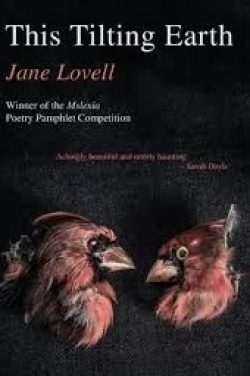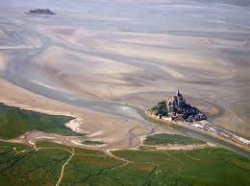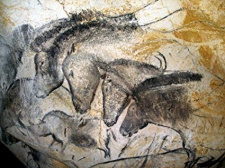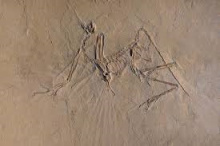Thinking about extinctions: 'This Tilting Earth', by Jane Lovell

The other day, I came across an interview with the poet Kim Moore in which she says in response to the question: What does poetry mean to you?
“This is a hard question! I’ve just had a baby, so my relationship with poetry has changed a little, in that it has been squashed into the edges of my life at the moment. But I guess poetry is my way of making sense of the world, of finding out what I really think, a way of making connections and these are all things I couldn’t live without doing. Poetry to me is those solitary moments of writing, when there is nobody to see or care whether it is any good or not, but it is also those solitary moments of reading, when you read a poem and put the book down because the poem is so good, because it has articulated something you didn’t know you felt.”
I’ll leave that with you for a while.
When I started to write a poetry blog I thought about how I wanted it to work. I thought it needed to have a reliable style/structure. What did that mean? For instance, I could rely on Roy Marshall’s poetry blog offering advice on the business of writing and compiling; I expected that Kim Moore would tell me what she’d been doing the previous week, before sharing a poem from someone she was currently excited about. Anthony Wilson would share a ‘lifesaving poem’ by doing a close reading in the context of its place in the narrative of his own life. And so on. So I couldn’t be doing any of that. It was already being done, and better than I could aspire to.
Instead of looking at blogs, I looked to journalism, and settled on the late AA Gill’s restaurant reviews in The Times colour magazine. What I always liked about Gill, apart from his acerbic prose, was the way he would come at the actual review obliquely, (say, musing on the manners of the English, or the hairstyles of Peckham, or whatever). I realised that for me it would also be a way of getting into the writing, so that by the time I got to the poetry I wanted to share, I’d have found some sort of rhythm, and a hook or a theme that put the poetry in context. I grew up with radio journalism/storytelling. Sometimes it works. But the plain fact is that I can’t just get straight into the poetry ... I have to think my way towards it. You’ve been warned.
I grew up (or older) with radio, which had its own version of blogging in the form of, say, Alistair Cooke’s weekly Letter from America; perfectly constructed, 15-minute pieces as elegant and apparently effortless as Fred Astaire’s dancing. He would approach his topic obliquely, too. As would the wonderful Garrison Keillor who would invariably begin It has been a quiet week in Lake Wobegon. It’s got to start the same way. As he says in my favourite episode you can’t disappoint them, but you have to surprise them. Once upon a time there was a poor woodcutter/three brothers ...The expected has got to spring a surprise. But the bottom line is the expected.
“It has been a quiet week here in Lake Wobegon. It snowed three feet on Tuesday ...” That’s how my favourite episode begins, in which we learn that a three-foot snowfall isn’t anything to write home about; this takes us to legendary snowfalls that have their own stories and thus to the tellers of the stories. And to Kenny, who’s “a chubby guy” who lives in a beat-up house on the outskirts. We can see him through his window (because we’ve taken a walk through town in the snowy night), and he’s telling a story to his kids. It’s Hansel and Gretel, and he’s vaguely uncomfortable about telling this story, and more about getting it wrong. We get to learn a lot about Kenny, his wife, the father he is alienated from and who is at this moment dying ; and also about the rules and uses of narrative. There’s a letter on the table which Kenny hasn’t opened. It’s from his dad who is trying to explain what cannot be explained. Kenny’s wife Joanne is on her way home from choir practice. The kids should be in bed. The house is in a mess. Whatever will she say when she sees it?
It has been a quiet week in Lake Wobegon. And here the governance of the nation is in chaos; the President of the United States has casually signed a death warrant on tens of thousands of Kurds (who unaccountably weren’t at Omaha Beach); our elected politicians are, at enormous expense and with our money, subverting the very purposes of language; and the streets of London have been brought to a standstill by young people and Extinction Rebellion.
It’s worth remembering that there have been five major extinctions in the long history of the Earth, the least catastrophic of which destroyed 75% of all living organisms, and the worst which accounted for 95%. Some happened relatively fast, like the one caused by a gigantic meteor strike. Some happened slowly over millennia, from an excess of carbon dioxide, from a scarcity of the same, from too much oxygen, or from not enough. The fossil record tells us all this. We are probably at the beginning of a sixth which is being accelerated by human agency. It’s little comfort to note that the Earth adjusted (though it’s tempting to say ‘recovered from’) to the last five and that it will probably do so again. It’s just that we’re unlikely to be around afterwards though other things will be. To put in perspective, today, extinctions are occurring hundreds of times faster than they would naturally. If all species currently designated as critically endangered, endangered, or vulnerable go extinct in the next century, and if that rate of extinction continues without slowing down, we could approach the level of a mass extinction in as soon as 240 to 540 years. The astonishing, wonderful, accidental concatenation of what we call life on earth doesn’t care for us at all. Which is no reason for us not to care for it, and for ourselves.

Let me tell you about all the things that hauled me in, and then I’ll share a couple of the poems before insisting that you go out, at once, and buy the book.
First thing: the title. This Tilting Earth. I suppose this is personal. I seem to have been fascinated by the fact of the Earth’s tilted axis, without which we would have no seasons, for decades. I think it started with Ted Hughes:
Brought to bare trees, to spike and shard
browned by cold, our birds
breast a homing departure; on wings press
to correct earth’s sure tilt into darkness
‘Nicholas Ferrer’ (Lupercal)
I spent a couple of hours yesterday trying to track it down. I’ve not consciously read this poem in 30 years. Why did that phrase stick? Why does it keep on popping up in poems as I write them? It comes uninvited, as in this from a poem of mine called ‘Viewpoint’.
Here, punctually, the earth rim tips up;
the sun’s disc eclipsed,
or this
A moon is strange as it comes
beyond the dark weight of hills
and it is not rising
but the huge world is toppling
O so slow towards the moon
in the dark ocean of the sky
For me it’s become an emblem of the accidents of our place in space and time, and simpler to hold in my mind than those that create our ideas of constellations like Orion or the Plough. The stability of that tilt relies on the gravity of the moon, which comes close and grows distant over huge spans of time. Our balance is so fragile. This tilting Earth; that word tilt is so exact, so layered. It seemed to me the perfect title.

So much for names and titles. What about the moments that memorise themselves as you read? The collection is packed with them. As a whistlestop tour will show. How about the painted horses of the Lascaux caves, threatened by the very breath of visitors? "They watch us with their oilbloom eyes. / We breathe and they may disappear." Jane Lovell does brilliant opening lines, too, like these:
They all ended up the same way, of course,
deep in the silt and swirl of the Thames,
I love the insouciance of this, the crafty pronoun that starts it. And this, too: "He remembers, briefly, plummeting,/ tilting slowly like a tree."
Think about the way those two verbs apparently work against each other until you visualise a man falling from a height, and realise how exact it really is.
She has a wonderful eye for the moment, for the image, as in that of the carts in the salt pans “with their drapery of halite”. Drapery. Precise and true, as is her observation of
quiet pans of algae, gypsum, clay
where egrets pick their way
through cubes of sky
The moments aren’t just visual. There’s a memorable line in the salt pan poem that captures the idea that the suspension of sound is so profound that the salt worker "is listening to the voice / of the salt, the tinkering of the sea".
“Tinkering”. One of those moments when I said ‘YES’ on the tram. One of the delights of these poems is her easy use of a huge vocabulary that’s always being used for its rightness. And not just for their rightness, but for their textures: grume, squirl, laggy, skilly, candlenut, cinnabar. These are poems that demand to be read aloud and tasted. There are poets whose knowledge and erudition become exclusive. Jane Lovell’s not one of them. There may be arcane bits of information but the meaning’s always supplied by the context. Every living thing in these poems is brought to mind , enchanted, in Macfarlane’s sense, with a concrete textured clarity that becomes a praise poem for living things, and a reminder that like Blake she fervently believes that everything that lives is holy.I’m tempted to go on and on quoting. My review copy’s studded with underlinings and post-its. But you should have got the picture by now. I’d like to work my way through the poems. But one of the bits of advice I was given about doing a reading was that you should ‘leave them wanting more’. This Tilting Earth does precisely that, and so will I. I’ll provide this link to another review which throws some light on more poems, and then finish up with a couple of poems and a bit of commentary.Here's the link first

The first homes in on one apparently inconsiderable outcome of the depopulation of a Hebridean isalnd. When the last St Kildans were evacuated in 1930, the St Kilda house mouse (Mus musculus muralis) very quickly became extinct. The St Kilda field mouse (Apodemus sylvaticus hirtensis) is still present.
Leaving Hirta
We remain cautious, haunting crannies in low walls
scabbed with moss and lichen,
sloughed roofs smouldering soot and mildew.
Without bread or grain, we grow thin.
Our litters fail.
Drawn to roar of sea and shingle,
we skeddle down past sallow blooms of roseroot, sorrel,
skirt the last remaining footprints brimming sky;
alert for skirl of skua, hook-clawed kestrel,
seek out sprat and crab between the rocks and kelp,
tats of shell at cliff foot caught in gravel, lifting, falling.
We have an instinct for water,
Our bellies rimpled films of skin,
bones hollow flutes funnelling the winds.
We grow thin; our litters fail.
Stiff with salt, the waves wash us away.

You understand that the crofters left, so who or what remains? What relies on grain? What lives in crannies? What fears the skua and the kestrel? What’s small enough to skirt a footprint, and what moves so quick under the sky? I love that word “skeddles”. All this is played out to the soundtrack of breaking surf, and the riddled scratch of shell fragments. This small extinction is contained in one understated and beautifully observed sequence. What struck me was its filmic quality.
I was delighted to learn the factual backstory that reminds us of the reflexive relationships in ecosystems. Animals, some animals, need us as much as we need them.
The next one is more mysterious. The narrator of this poem is clearly at home with a process that is both mundane and numinous. It’s a routine and a ritual the purposes of which (it seems to me) are so normal as to be implicit, and need no explanation, despite the apparent horror of the opening image.
Tallow
Her eyes bleach the colour
of milk, head coming up blind
and turning.
Once the fat is risen
we syphon the cooling tallow
into flagons, set them in line,
add beeswax and lye,
stand back from its boiling and hissing,
do not breathe until it stills.
I pour the soap into moulds,
scatter over cranesbill, nibs of lavender
and marigold,
wrap the cooled cakes
in scraps of vellum, stack them
in the drystore.
It's warm there
and dark enough for owls.
Above shelves of pickled fruit
and bottled juice,
cowls of gut hang like vines.
It is light tonight, cloudless.
We carry her flesh to fire, break bread,
sing her name.
Tomorrow the women will roast the bones,
use the crushed chalk to make buttons
and beads.
No one speaks of the old days.
We light candles but no one prays.
Each moon has its feast.
She was our chosen one, our beauty.
Some creature, or someone, has been rendered down to soap. It’s all domestic and simple and normal. It’s done with care and something approaching reverence. In the manner of the native Americans, nothing will be wasted: “Tomorrow the women will roast the bones, / use the crushed chalk to make buttons / and beads.”
As a reader, I’m fascinated to be put in the position of a stranger, someone stumbling upon a lost way of life, to be given a guide who explains a routine without ever explaining it, without telling us why No one speaks of the old days.
She’s an artful poet, Jane Lovell; one who engages all your senses and sympathies. What a great collection this is.
Jane Lovell is the Poetry Society Stanza rep for Mid Kent. She has had work published in Agenda, Earthlines, Poetry Wales, Magma, The North, the Honest Ulsterman, Dark Mountain, The Lonely Crowd, Ink Sweat & Tears, Zoomorphic and Elementum, and in various anthologies including One for the Road from Smith Doorstop.She was awarded the Flambard prize in 2015, and has won the South Downs poetry competition 2017 and the Wealden literary festival 2018 writing competition. In 2018 she won the Wigtown poetry competition, and was also joint winner of the Coast to Coast to Coast pamphlet competition.
Jane Lovell's pamphlet Metastatic is published by Against the Grain [2018].
This Tilting Earth is published by Seren [2019]




